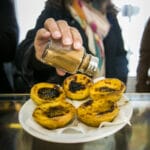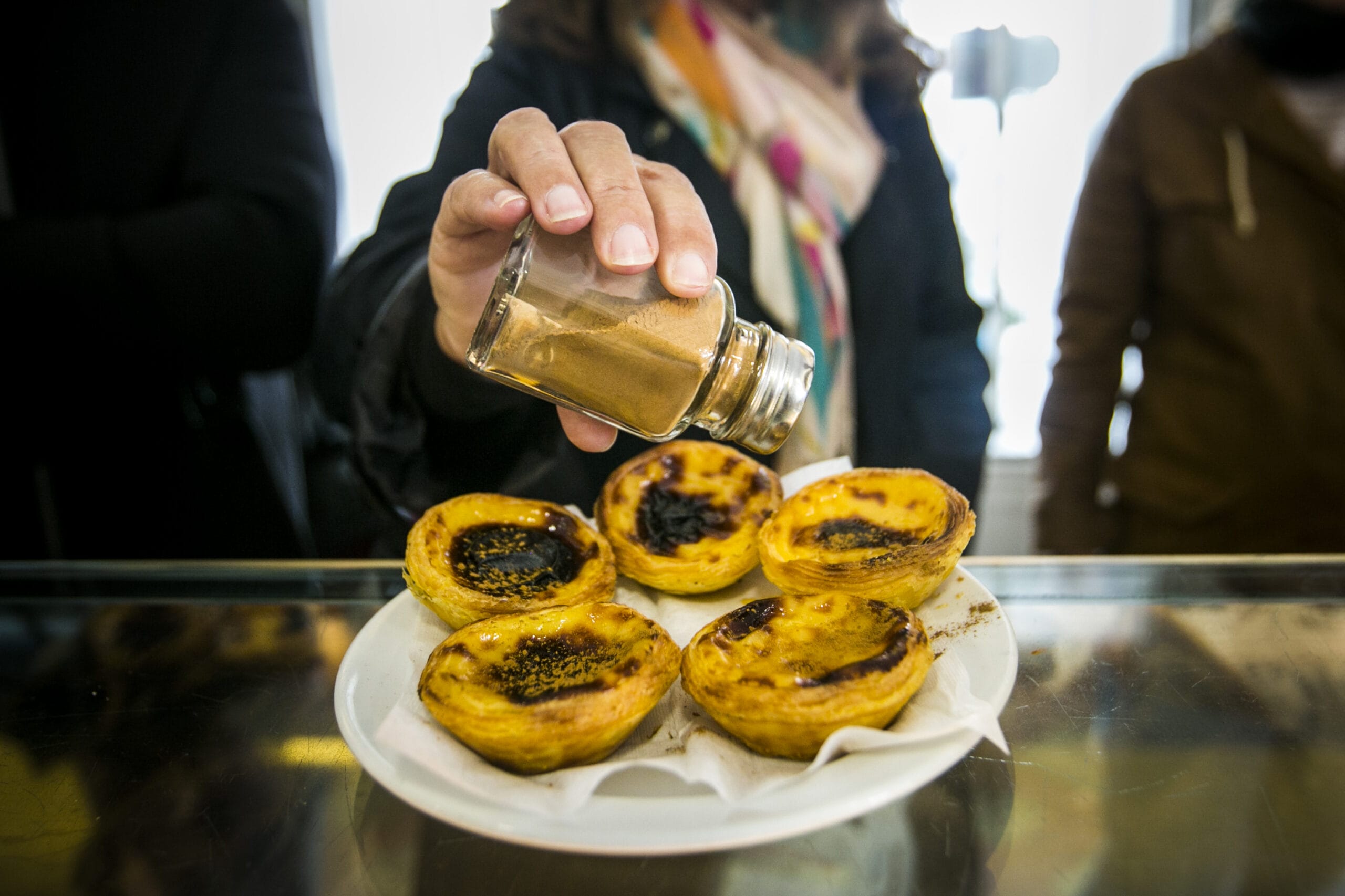From the mid-1800s to World War I, Marseille played a prominent role in France’s industrial revolution. Semolina mills, pasta manufacturers, soap factories, and oil and sugar refineries churned out goods to be loaded on giant ships at the Vieux-Port and shipped across the globe. Most of these factories shuttered after World War II, leaving a blight on the Quartiers Nord (Northern neighborhoods) where they were based. Recently, culinary entrepreneurs like Tava Hada Pilpeta’s gourmet harissa and Sarabar’s exceptional spices are aiming to revitalize the area’s food processing past in an artisanal way. Two others who are making their mark on the area are Stéphane Chevet and Georges Temam, who are transforming Marseille’s strong bond to the sea into smoked and cured delicacies.

Located in an unassuming, modern office park, their white, aluminum-sided warehouse doesn’t have any signs of food – save for the scent of burning wood that emanates from inside. Here, Stéphane Chevet runs Maison Matthieu, a fumaison that smokes (fumer) local sardines, mackerel, and octopus. Beside him, Georges Temam salts and cures mulet (mullet) egg sacs to make poutargue for Stéphane and for Georges’s own brand, Bottarga L’Authentique. The two artisans are linked by their culinary talents, their passion for fish, and a commitment to hands-on, high-quality fabrication. Driven by a belief that good food makes for great living, their business model is centered around convivial sharing rather than profit-centric selling – as is often the way in Marseille. What’s more, Chevet is the only artisan in France who smokes Mediterranean fish while Temam is maintaining a centuries-old tradition that has since become industrialized.
Poutargue dates back 4,000 years ago to ancient Egypt, where tombs are etched with images of the delicacy. After sailing around the Mediterranean in Greek and Roman times, boutargo – the Provencal name for bottarga (Italian) and bitârikha (Arabic) – landed in Provence in the 16th century in Marseille and nearby Martigues. Temam discovered the funky fish eggs in his Jewish Tunisian family, where they were served at Shabbat and holidays per the custom of other Mediterranean Jews. “It’s the only food that you can live on alone,” he proselytizes, “A complete food that is rich in vitamins, Omega 3s, protein and iodine.” Yet as the delicacy became industrialized, the poutargue he found in shops was dry, less flavorful and more expensive. (Note: though nicknamed “poor man’s caviar” for being cheaper than Russian sturgeon eggs, poutargue still costs 25-30 euros an ounce.) Georges launched Bottarga L’Authentique in 2018 to change this.

“In a nutshell, poutargue is salt and time,” he explains while pulling out a tray of unprocessed egg sacs. Unlike caviar’s itty-bitty black pearls or the plump orbs of salmon roe, mullet’s egg sacs are the size of fish filets, with an indentation down the middle – hence why they’re called jambes (legs). Georges’s eggs come frozen from the Azores since the mullet stocks have depleted in the Mediterranean. Once defrosted, he moves quickly, covering them in a thick blanket of salt and sugar, the latter his signature way of providing the beautiful saffron hue that other poutarguiers get from added nitrates. Once rinsed, Georges removes the sac’s bitter veins and visual imperfections with a spoon, a time-consuming step the industrial producers skip in sacrifice for flavor and look.
Artisanal poutargue is often dried in the Provençal sun and wind then compressed with a weight on top. Georges prefers the Japanese technique for karasumi (poutargue in Japan) which avoids compression to retain the eggs’ nutrients and natural moisture. Though drying takes 8-10 days, Georges brings out a three-day-old egg sac for us to taste the difference. As soft as jelly and so fishy it makes our mouths pucker, we understand why aging is essential.

We’ve tasted many poutargue in our day, as it’s the star of local apéro alongside olives. The eggs are as pungent as sea urchin with a sticky texture that appeals or repels. Like Marseille’s Bonne Mère statue that beams above the city, Georges’s poutargue stands above the rest, incredibly moist and smacking of the sea without being too strong. “We sell the prettiest jambes in Marseille,” he smiles. “Or at least the tastiest.” For the purists, poutargue is eaten solo in thin slices, with olive oil or lemon, or atop buttered bread to mellow its fishiness. Georges slices his thick, explaining that “like in cooking, one must be generous.”
Many Marseillais, and Italians for that matter, grate poutargue on pasta tossed with lemon zest and olive oil to temper its briny wallop. On a previous visit, Georges served slices atop fresh mushrooms for a land-sea (terre-mer) combo alongside tiny glasses of ice-cold Boukha, a Tunisian-Jewish fig-based aperitif that pairs surprisingly well. Ever passionate, he suggests experimenting, using poutargue as a replacement for smoked fish.

Stéphane started Maison Matthieu after honing his smoking skills for 25 years, when a trip to Sweden inspired him to build a homemade smoker in his garage. Named after his son – “the only thing better than my fish,” he winks – Maison Matthieu was first centered around salmon, a popular delicacy in France, especially around Christmas and New Year’s. A desire to showcase the local terroir motivated the expansion into Mediterranean fish.

“The fattier the fish, the more they like smoke,” explains Stéphane, making pelamide (small tuna), poulpe (octopus), mackerel and sardines ideal. He sources from sustainable fishermen at the nearby ports of L’Estaque and Caro. When they catch more than they can sell, they appreciate his business, since fresh fish lasts just three days compared to the seven weeks of preserved fish. What’s more, in addition to being the only artisan who smokes Mediterranean fish, Stéphane is also unique in his usage of local wood.
Instead of the typical beech, Stéphane’s “special touch” uses Provençal fruit trees, like fig, apricot, cherry and néfle (medlar, a small, pear-like fruit), which deliciously infuse the fish with a subtle smoke. He sources the wood in the region’s hills or via farmer friends who have a surplus. Using a wood plane, he shaves branches into ribbons for even burning in his DIY fumoir (smoker) made from an old butcher’s cabinet. As he pulls out a batch of sardines, a giant cloud of smoke engulfs him, making him resemble a mad scientist. Yet, he’s all business, clad in a chef’s coat, hair net and rubber boots (like Georges) to adhere to the strict sanitary measures of food production.

These sardines are part of Maison Matthieu’s latest offering: Marseille’s emblematic fish marinated in its emblematic tipple, pastis. For the collaboration, his, and our, friend, Marstella, at local distillery Cristal Limiñana, created a pastis rich in local flavors: thyme, fennel and rosemary notes. We first tasted the fish solo, then paired with sips of pastis. Not surprisingly, the two icons go together like olives and rosé. Most recently, Stéphane and Georges are smoking poutargue, a first of its kind that tastily merges old and new traditions.
Maison Matthieu’s fish is sold online, at épiceries around town like Sistaou and Chez Francette, and the monthly farmers’ market at nearby Aygalades. Georges’s poutargue is available via Maison Matthieu’s website and L’Audacieux in Le Panier, yet most of his word-of-mouth customers simply order via text. Both Georges’s and Stéphane have loyal followings for their small-batch, big-flavored fish. For once you taste their products, it’s hard not to become hooked.
Published on January 24, 2024
Related stories
April 26, 2024
MarseilleAcross Marseille, winter’s neon-yellow mimosas have given way to amandiers’ (almond trees’) fragrant white and pink blooms. Here, the French adage, “en avril, ne te découvre pas d'un fil. En mai fais ce qu'il te plaît,” (in April, don't remove a stitch. In May, do as you wish,”) is oft quipped, for our springtime weather…
April 4, 2024
LisbonQuick Bite: On this food tour in Lisbon, we’ll experience a cultural feast, tasting some of the most diverse bites of the city’s gastronomy and meeting the people behind them. The oldest city in Western Europe, once the hub of a trading empire that connected Macau in the east to Rio de Janeiro in the…
December 8, 2022
LisbonAs amazing as Lisbon’s food and drink scene is, many of its markets are underwhelming. The sad truth is that it’s necessary to head outside of the capital to witness spaces that showcase the real bounty of Portugal’s fields, orchards, vineyards, farms and waters. The recently-renovated Mercado do Bolhão, in Porto, is one such place.…























































































